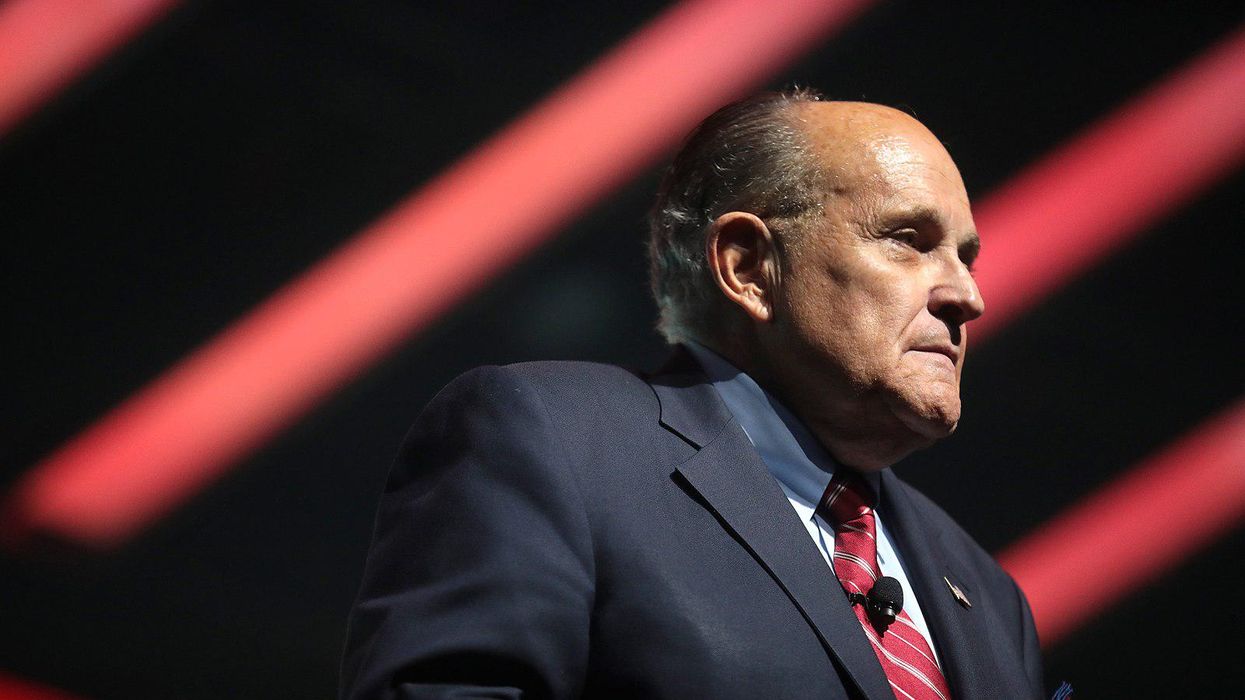New York Court Suspends Giuliani’s Law License Over Election Lies
Reprinted with permission from American Independent
Rudy Giuliani was suspended on Thursday from practicing law in New York State, after a panel of judges found he violated the professional rules of conduct in his effort to overturn former President Donald Trump's 2020 election loss.
"We conclude that there is uncontroverted evidence that respondent communicated demonstrably false and misleading statements to courts, lawmakers and the public at large in his capacity as lawyer for former President Donald J. Trump and the Trump campaign in connection with Trump's failed effort at reelection in 2020," the judges' decision read.
They continued, "We conclude that respondent's conduct immediately threatens the public interest and warrants interim suspension from the practice of law."
Giuliani can fight the interim suspension. However, the judges wrote that his conduct was egregious enough that it would likely "result in substantial permanent sanctions" and decided to suspend his license until a full investigation could be completed.
Giuliani's suspension marks a stunning fall from grace for the former New York City mayor, who once served as U.S. attorney for the Southern District of New York — one of the most prestigious federal court districts in the country, which prosecutes some of the most high profile financial crimes and terror cases.
The decision was scathing, saying Giuliani lied multiple times about everything from dead people voting to the number of absentee ballots cast as part of his campaign to overturn Trump's loss.
It also said Giuliani's "misconduct directly inflamed tensions that bubbled over into the events of January 6, 2021 in this nation's Capitol," referring to the pro-Trump insurrection that resulted in several deaths, tens of millions of dollars in damage and repairs, and federal charges against at least 500 people.
The decision also pointed to Giuliani's disastrous appearance before a federal court in Pennsylvania — in which the Trump campaign sought to overturn Trump's election loss in the state — as a violation of New York's Rules of Professional Conduct for lawyers.
Giuliani, they said, "repeatedly represented to the court that his client, the plaintiff, was pursuing a fraud claim, when indisputably it was not." The decision added that Giuliani's "mischaracterization of the case was not simply a passing mistake or inadvertent reference. Fraud was the crown of his personal argument before the court that day."
The judges similarly cited Giuliani's now infamous press conference at Four Seasons Total Landscaping, during which he claimed that champion boxer Joe Frazier was "still voting" in Pennsylvania despite being dead. That allegation, unsurprisingly, turned out to be false.
"The public records submitted on this motion unequivocally show that [Giuliani's] statement is false," the judges' decision read. "Public records show that Pennsylvania formally cancelled Mr. Frazier's eligibility to vote on February 8, 2012, three months after he died."
Giuliani told the court that he didn't know his statement was false. The court disagreed.
"As for respondent's argument that his misstatements were unknowing, respondent fails to provide a scintilla of evidence for any of the varying and wildly inconsistent numbers of dead people he factually represented voted in Philadelphia during the 2020 presidential election," the judges wrote.
Giuliani is currently facing other legal challenges for his role in trying to overturn Trump's loss.
Dominion Voting Systems filed a $1.3 billion lawsuit against Giuliani in late January, claiming he had lied about the voting machine company and had pushed false claims that its tech had been rigged to swing the election for President Joe Biden.
Smartmatic USA, another voting machine company, also filed a $2.7 billion lawsuit against Giuliani, as well as Fox News and fellow lawyer Sidney Powell, in February, claiming he and Trump's allies had knowingly pushed damaging conspiracies about the company in their attempt to overturn the election.
Giuliani's lawyers responded to the court's decision on Thursday, saying in a statement that the move to suspend him was "unprecedented as we believe that our client does not pose a present danger to the public interest."
"We believe that once the issues are fully explored at a hearing, Mr. Giuliani will be reinstated as a valued member of the legal profession that he has served so well in his many capacities for so many years," they added.
Correction: This article was updated to note that Giuliani served previously as U.S. attorney for the Southern District of New York, not district attorney.
Published with permission of The American Independent Foundation.















